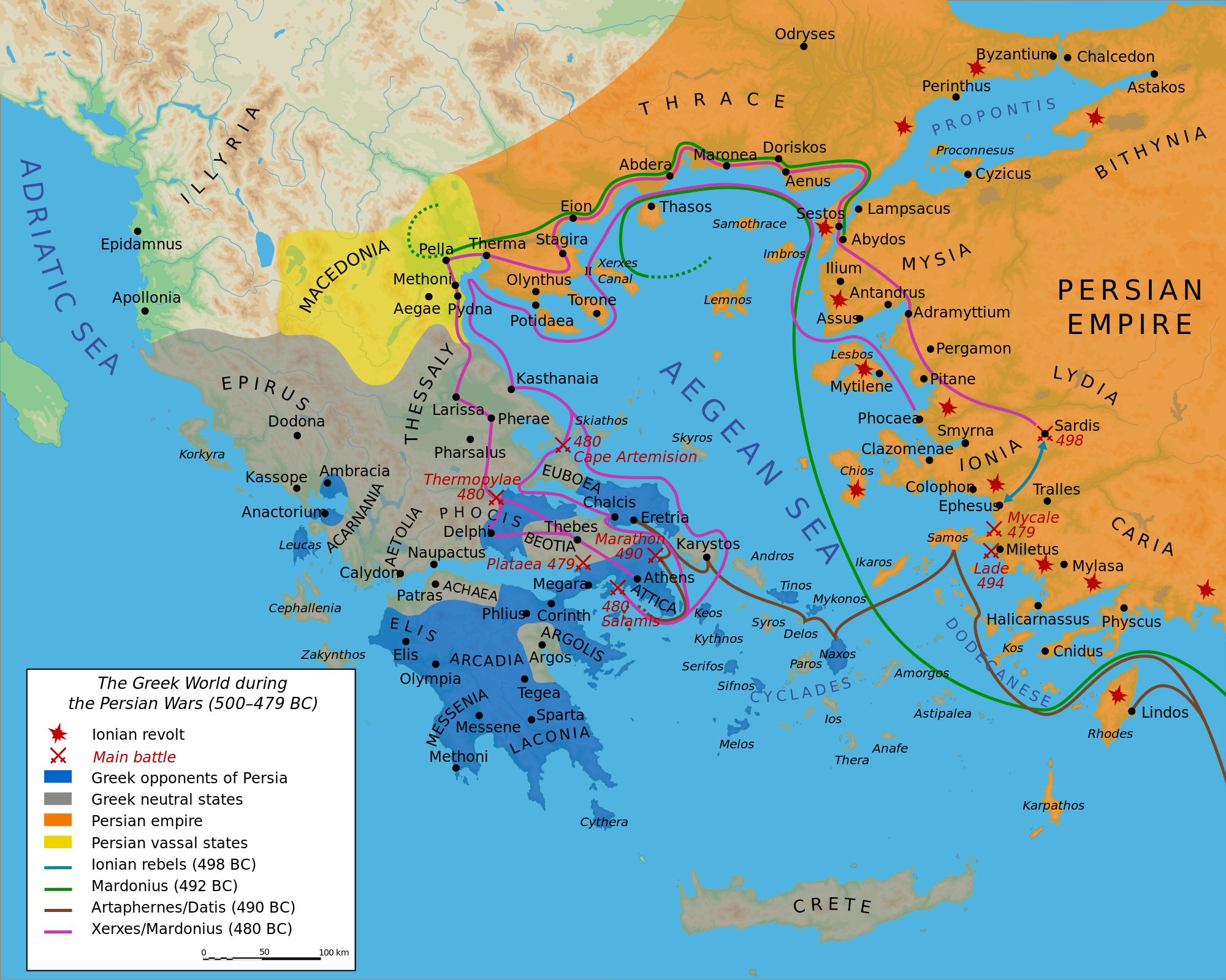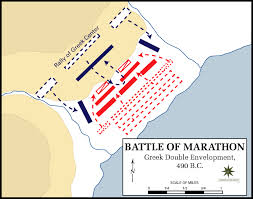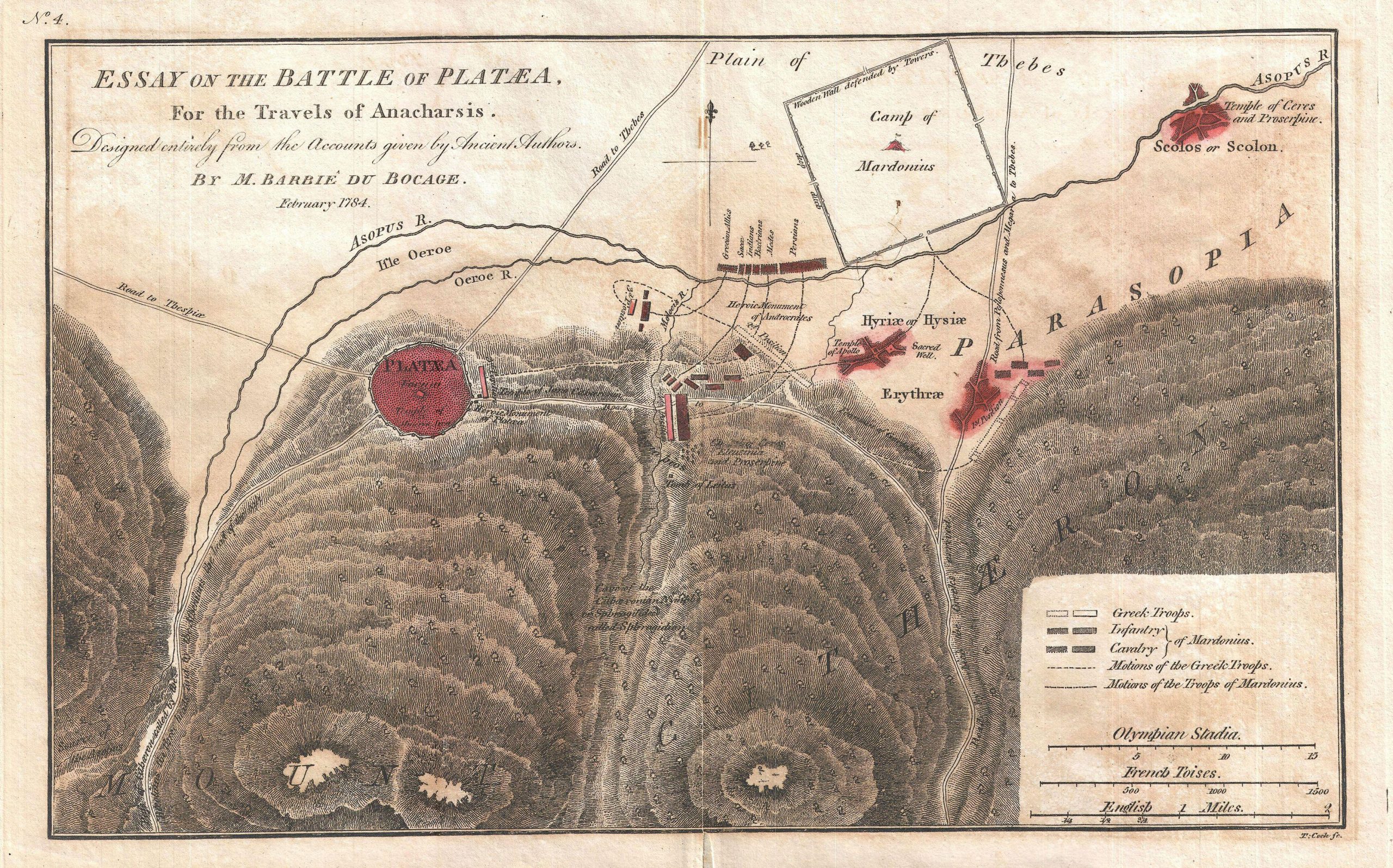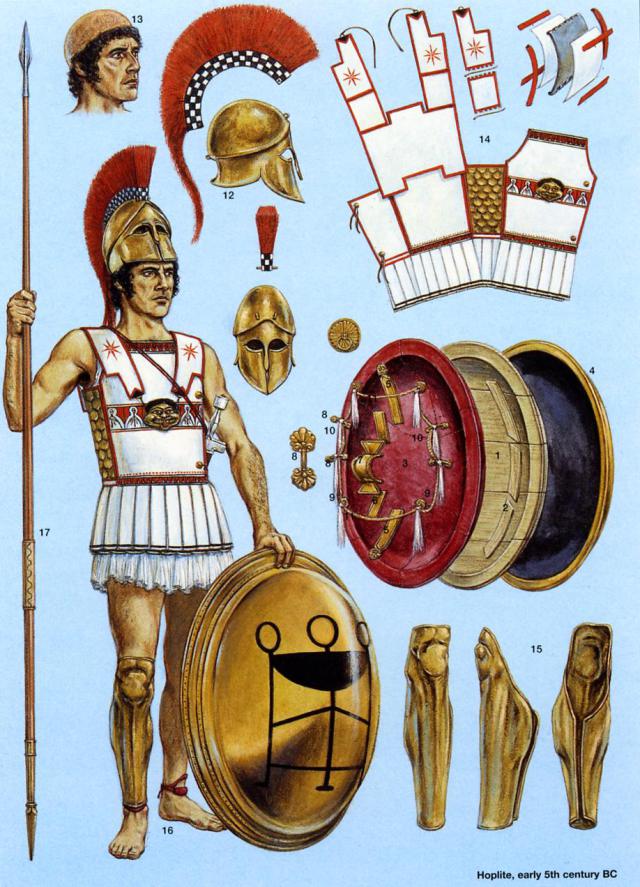The following is an excerpt (pages 101-111) from Ancient and Medieval History (1946) by Francis S. Betten, S.J. Although some information may be outdated, the Catholic historical perspective it provides remains pertinent. Use the link at the bottom of post to read the previous/following pages. Use the Search box above to find specific topics or browse using the Resources tab above.
CHAPTER XI
THE PERSIAN WARS
THE OPENING OF THE STRUGGLE
113. The Two Antagonists. — Let the students remember how Cyrus the Great, the founder of the Persian Empire, conquered the smaller empire of Lydia in Asia Minor, and a few years later that of Babylon (§ 68). His son Darius added Egypt. Towards the east the empire extended as far as the regions of the Indus River.
The coast of Asia Minor on the Aegean Sea was part of Hellas (§ 74), and for two hundred years before 500 B.C. the most cultured part. The Asiatic Greeks are referred to as the Ionian Greeks, though only the central section was inhabited by Ionians. The last king of Lydia, Croesus, had conquered them. His rule was mild, and the cities had merely to pay a moderate tribute. Their internal affairs were not interfered with. Things became different when Persia had defeated Croesus and put an end to his empire. Persian rule bore heavily upon the Ionians.
Hellas had three parts: the eastern part, namely, the Greek cities on the coast of Asia Minor, the central part or Greece proper, and a western part, the coasts of southern Italy, called Magna Graecia (§ 75). In the western section, especially in Sicily, the Greeks were opposed by the mighty empire of Carthage, the great colony of the Phoenicians. Just when the struggle with Persia began, Carthage also made a mighty effort to secure the flourishing Greek cities on that island. This struggle kept the western Greeks from helping their kinsmen in the east.
Conditions in Greece were not very favorable. Athens was at war with the island of Aegina and with Thebes, and several other wars were going on. Only the Peloponnesus was in some way united under Sparta. This “ Peloponnesian League,” however, was at best a very loose confederacy, in which the rights and duties of the members were not at all definitely fixed.

113. The Ionian Revolt in 500 B.C. — Cyrus the Great was angry with the Greeks, because they had not sided with him against Croesus. After a short fight for their independence they fell under the Persian yoke. The “Great King” found it best to raise a tyrant in each city, who would owe his elevation to him and depend on his support. In 500 the Ionians deposed their tyrants, formed an alliance with one another, and revolted against Persia. In vain did they apply to Sparta for help. Athens sent twenty ships, and little Eretria sent five. At first the enterprise was successful. The allies even took Sardis and plundered it. But the power of Persia, the liberal flow of Persian gold which made traitors among them, and mutual suspicion, broke up the league. The cities were again subdued.
THE FIRST TWO PERSIAN ATTACKS
115. The chief cause of the Persian Wars was the tendency of the “Great Kings” to expand their territory so as to include every land worth having. Two European countries, Thrace and Macedonia, were already Persian provinces, where satraps and tyrants guarded Persian interests. It was now the turn of the Greek peninsula to be attacked. Its cities were growing wealthy, and Persia coveted them for their trade and their ships. Athens and Eretria had been wise as well as generous in aiding the Ionians, because the Ionian revolt helped to delay the Persian attack upon Greece itself.
116. First Persian Expedition, 492. — King Darius fitted out a large army, which began its march along the northern coast of the Aegean and down into Greece. It suffered terribly from constant attacks of unsubdued tribes of Thrace. The fleet, which was to furnish the army with provisions, was dashed to pieces when rounding the rocky promontory of Mount Athos. Under these circumstances the commander, Mardonius, gave up the hope of success and returned to Asia.
117. Second Persian Expedition, 490. — Mardonius’ failure filled the Great King Darius with wrath. The general was disgraced and preparations began at once for a second expedition. Meanwhile Persian “heralds” went to the Greek states and islands to demand “earth and water” as token of submission. The islands yielded. The continental states refused. In Athens and Sparta the people were so indignant that they threw the heralds into a well, telling them to take there as much earth and water as they wanted. This violation of the sacred character of ambassadors, of course, roused Darius’ anger to the highest pitch.
In 490 the Persians were ready for a new expedition, commanded by Datis and Ataphernes. The whole army embarked on the island of Samos and sailed directly across the Aegean Sea to Euboea. The mighty host easily took the city of Eretria, aided by treachery. The inhabitants were sent in chains to Persia, as punishment for assisting the Ionians. The expelled tyrant Hippias was with this army, and pointed out the little plain of Marathon as the best place for disembarking the troops in Attica.

118. The Small Forces of the Greeks. — Seeing the large number of the enemy, most of the Athenians wished to fight behind their walls. But the wiser men feared, if the city were besieged, some of the party of Hippias might betray it. Happily Miltiades, one of the ten generals, persuaded his colleagues to march out and attack the Persians at once. The Spartans had been informed early enough of the common danger, but they delayed. An ancient law, they said, forbade them to set out on an expedition before the full moon. It was evident they did not want to help. Only one small Greek city, Plataea in Boeotia, remembered that Athens had once protected its democratic government against the oligarchs of Thebes, and sent what it could send, a thousand hoplites. These, with the ten thousand Athenians, were to face the enormous host of the mighty Persian Empire, which perhaps was ten times their number.
119. THE BATTLE OF MARATHON. — Miltiades, the Greek commander, drew out his center line as far as he could in order not to be outflanked by the Persians. The stronger wings were to do the main work. These he ordered to advance faster than the thin center. To make the work of the Persian archers useless, the Greeks broke into a swift run as soon as they were within bowshot distance from the enemy’s lines. Once at close quarters their heavy weapons gave them an overwhelming advantage. Though the Persians fought bravely, their wicker shields were no protection against the thrust of the Greek spear, and their light lances and scimitars made no impression on the bronze shields and armor of the hoplites. When the Greek center gave ground, the strong wings, which had meanwhile routed the forces in their front, wheeled around, and began to close in on the Persian center. In complete disorder the Asiatics fled to their ships.
Miltiades still feared a direct attack upon Athens, and treason in the city. So the brave warriors, though worn out by the battle, marched back. The Persian fleet, which had sailed around the promontory of Sunium, indeed appeared off Athens. But the Asiatics did not care to face again the men of Marathon.

120. Importance of Marathon. — From the military standpoint the battle of Marathon was an event which showed the superiority of the Greek hoplite over the Asiatic soldier, and what is more important, it decided whether Oriental civilization should crush out the Greek. Greek culture had in itself the germs of future progress, while the East was inert and unfit to create new forms of human culture. Greek life, literature, and thought were the starting point of the later intellectual development of Europe. This was saved by the victory of Marathon.
The victory was of more immediate importance for Athens and Greece. It took high courage to stand before the hitherto unconquered forces of mighty Persia. Athens had this courage, and showed to all Greece that the Persians could be defeated, “whereas up to this time,” as says Herodotus, “the very name of Mede (Persian) had been a terror to the Hellenes.” Athens herself grew to a heroic stature in an hour. The sons of the men who conquered on that field could find no odds too crushing, no prize too dazzling in the years to come.
121. Athens between the Second and Third Persian Expeditions. — Soon after Marathon, Egypt revolted against Persia and kept the forces of the empire busy. This gave the Greeks ten years to prepare for another attack, but little was done except by the Athenians. The people first began to secure themselves against internal troubles. Though Hippias had fallen at Marathon, the people feared that some aristocrat in the city might try to restore the dominion of the nobility, with the help of the Persians. Miltiades, the victor of Marathon, was the scion of a noble family. Though his patriotism could not be questioned, he had influential enemies in the popular party. When he failed to take the island of Paros, the courts sentenced him to pay the cost of the expedition, which amounted to an immense sum. It is said that the hero of Marathon died in a debtor’s prison. Other men were gotten rid of by ostracism.
The man that came to the fore was Themistocles, no doubt a very able statesman, but one who did not scruple about the means he chose for his end. Like many others Themistocles was convinced, first, that the struggle with Persia was by no means over; and second, that the enemy must be met on sea as well as on land, and that Athens must build a powerful fleet. His chief antagonist was Aristides, surnamed “the Just,” a man less gifted with political farsightedness than Themistocles though a much nobler character. Aristides became a victim of ostracism. At this time silver veins were discovered in Attica, and Themistocles persuaded the people to use the revenues from them for the construction of warships. Thus in three years Athens became the greatest naval power in Hellas.
THE THIRD PERSIAN ATTACK
122. Persian Preparations.—Meanwhile the great Darius was succeeded by his less capable son Xerxes. The Persians resolved to return to the plan of the first expedition, and to make better preparations. A bridge of boats was thrown across the Hellespont for the army. To avoid disaster for the fleet at Mount Athos, a canal was dug back of the rocky headland, an engineering work which took three years. Supplies were provided in stations along the way. Ancient reports place the Persian army at one to two million; probably it had about half a million; but at any rate, it greatly outnumbered whatever forces the Greeks could muster.
123. Greek Preparations. — The danger forced the Greeks into something like unity. Athens and Sparta called an Hellenic Congress at Corinth, at which all the cities bound themselves by oath to aid one another. Sparta was formally recognized as leader. But messengers sent to the outlying parts of Hellas returned empty-handed. The Greeks in Magna Graecia and Sicily had their hands full with a Carthaginian invasion. The outlook was gloomy. Some cities, among them Thebes, were known to be wavering and unreliable. Even the Oracle of Delphi, which could have done so much to buoy up the hopes, gave confusing and unintelligible answers.
124. Plans of Defense. — When examining the map of Greece after page 70, the student will easily see that there were chiefly three points at which a small number might dispute the passage of a large army: the Valley of Tempe, the Pass of Thermopylae, and the Isthmus of Corinth. The Spartans, selfishly and foolishly, insisted that resistance should be made on the isthmus, and that two thirds of Greece should be given up. They overlooked the fact that, even if the enemy were stopped at the isthmus, the Persian fleet could have landed troops at almost any point on the Peloponnesus. Reluctantly they sent a small corps to Tempe, which, however, at the approach of the enemy, retreated. At once the cities of Thessaly joined the invader with their powerful cavalry.
126. Thermopylae. — This loss of Thessaly made it evident even to the short-sighted Spartans that to abandon central Greece would mean another strengthening of the Persians. So they reluctantly concluded to make a stand at Thermopylae, a pass which was only some twenty feet wide from the rocks to the sea. The narrow strait between the land and Euboea made it possible for the Greek fleet to prevent the Persian ships from landing troops in the rear of the pass. A small force, three hundred Spartans under King Leonidas and a few thousand allies, was sent to Thermopylae.
Battle was joined at once on land and sea for three days. Four hundred Persian ships were wrecked by a storm, and the rest were checked by the Greek fleet in a sternly contested conflict at Artemisium. On land Xerxes flung column after column into the pass, to be beaten back each time in rout. On the third night Ephialtes, “the Judas of Greece,” guided a force of Persians over a narrow mountain pass, which Leonidas had left unguarded, because he did not think the Persians could use it. When he was informed, during the night, of the Persian move, he saw that the pass was lost, and sent away all the allies. But in obedience to the law which forbade the Spartans to leave a post assigned to them, he with his three hundred continued the resistance until all had fallen to a man. If Sparta had shown little generalship so far — the loss of the pass meant the loss of central Greece in addition to Thessaly—that little band of heroes had set to Greece an example of undaunted bravery, which has stirred the world ever since.
126. Activity of Themistocles. — The cities of central Greece joined the Persians, above all the aristocrats of Thebes. The Spartans withdrew the army to the isthmus and began the erection of a wall across it. The fleet sailed back from Artemisium to Athens. At Athens there was great confusion as to what to do. An oracle had advised that the city must be defended by wooden walls. Many applied this to the citadel of Athens, the Acropolis, which had once had wooden fortifications. Themistocles, however, persuaded the people that the wooden walls meant the ships. Yet the fleet was on the point of breaking up. The commanders of the various detachments wished to sail home to defend their own cities. The Spartan admiral was bent upon retiring to some port in the Peloponnesus. With great difficulty Themistocles, whose view was anyhow of great weight, entreated them at least to give their aid in removing the inhabitants of Attica to the island of Salamis. The Persians marched into the city, and the Athenians could see from Salamis the flames that destroyed their homes and plantations, and reduced the country to a wilderness.

The Persian ships filled the wide bay east of Salamis. The Greek fleet lay anchored in the strait of Salamis between the promontories which stretch out northward towards the mainland. The sentiment was such that it might disperse any moment. Themistocles wanted it to fight a sea battle on this spot. He resorted to a very bold trick. During the night he sent a trustworthy slave to Xerxes with a note. The Greeks, he said, were on the point of sailing to their homes. Should they accomplish this, Xerxes would be obliged to pursue each squadron individually, while now he had them all in one trap, provided he would block up the passage toward the southwest. During that night Aristides, who had been recalled from banishment, arrived in Salamis and reported that the southwest passage was closed. Xerxes had himself gone into the trap. There was now no choice left to the Greeks. They had to fight. Xerxes had a throne erected for himself on a favorable point of the mainland, from which to witness the victory of his armament and the end of Greek power. Things turned out differently.
127. THE NAVAL BATTLE OF SALAMIS, 480 B.C. — The place was very unfavorable for the masses of the Persian ships. Worse than this, neither sailors nor commanders thought of meeting with any serious resistance, and orders had been given carelessly. The first Persian lines, finding themselves fiercely attacked, began to fall back while the lines in the rear pressed forward. The Greeks knew exactly what to do, and they did it. They worked terrible havoc in the jam caused by the confusion in the Persian lines and the narrowness of the place. Ship after ship went down to the bottom or foundered on the cliffs. The sea disappeared under the bodies of the slain and the wreckage of the vessels. The struggle lasted from morning to night. The Great King had seen his ships sail proudly into the strait.

“He counted them at break of day —
And when the sun set, where were they?”
— BYRON.
The Greeks expected the battle would be renewed the following day. But Xerxes gave up all hope. With the remainder of his fleet — three hundred out of the fifteen hundred he had brought from Asia — he stole away in the night and took the shortest route to Asia Minor. (See Ancient World, note on page 200 on Greek warships.)
128. Athenians and Spartans after the Battle of Salamis. — An army of several hundred thousand Persians remained in Greece under the old commander Mardonius. For the time being, it withdrew to Thessaly for the winter quarters, to renew the war the following spring. Mardonius, realizing that the Athenians had been the soul of Greek resistance, tried to win them over. He offered them an alliance under the most favorable terms and promised to rebuild their city at the expense of Persia. The Spartans were terrified. They sent a messenger to entreat them not to desert the cause of Hellas. When the messenger arrived, the Athenians had already refused Mardonius’ offer. They now asked the Spartans to take the field early enough so that Athens need not be abandoned without battle. The Spartans gave the promise but did not keep it. Mardonius approached rapidly, destroyed what had been built up in Athens, and devastated Attica frightfully. He then retreated to the plains of Boeotia.
129. THE BATTLE OF PLATAEA, 479 B.C.—Sparta still clung to her stupid plan of defending only the Peloponnesus. However, the representations of some of her own allies made the ephors see the uselessness of a wall across the isthmus, should Athens be forced into an alliance with Persia. To the surprise of the Athenian ambassadors in Sparta, who had given up all hope, Sparta sent fifty thousand Peloponnesians northward. The contingents of Athens and other cities brought the total up to about 100,000. These fought near the little town of Plataea against a threefold number of Persians. Spartan valor and Athenian skill and dash won the victory. Mardonius himself fell, and the battle ended in a massacre. It is said that out of 260,000 Persians only 3000 returned to Asia.

130. Importance of the Greek Victories. — What was said of the importance of Marathon is much more true of Salamis and Plataea. Marathon saved Greece and Europe for the time being. Salamis and Plataea saved them for all time to come. Without Marathon there would have been no further victories. After Salamis and Plataea no more were needed. No Persian fleet ever again sailed from Asiatic ports to reach the coasts of European Hellas. No army ever again set out to devastate the ancient “land of the free and home of the brave.” — On the same day, it is said, on which the Persian fleet went down in complete defeat, the Greeks of Sicily, too, won a decisive victory over the Carthaginians at Himera, which for a time closed the struggle between the Hellenes and Orientals in the west.
To the Greeks themselves their victory opened a new epoch. They were victors over the greatest world empire. They had conquered because they were animated by love of country and love of their free political institutions. The war was each man’s own affair. They fought for no despot, as did the Persian soldiers. Unlimited confidence gave them still greater power. The matchless bloom of Greek art and thought, in the next two generations, had its roots in the achievements of these immortal battles.
Athens in particular gained the most. Spartan shortsightedness and selfishness had become evident. Nobody could deny that the victories had been won because of the intellectual leadership, the unselfish patriotism, and splendid energy of the Athenians. This prepared the time when Athens was to take over the political leadership of Greece.


